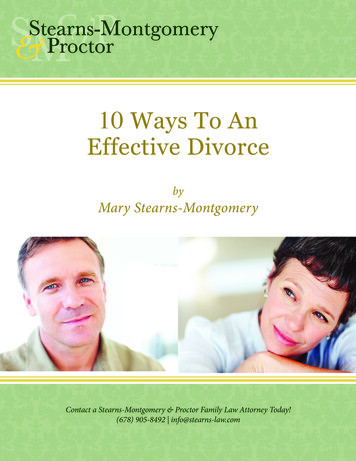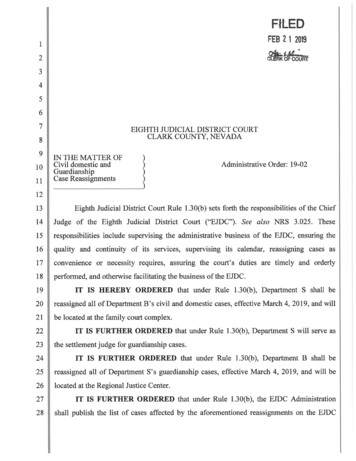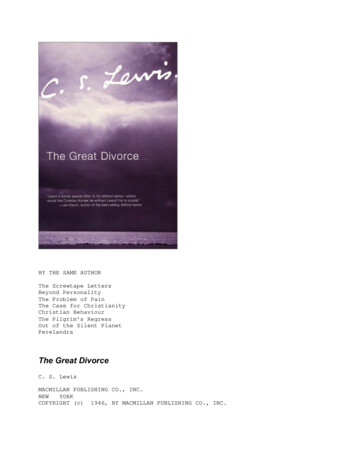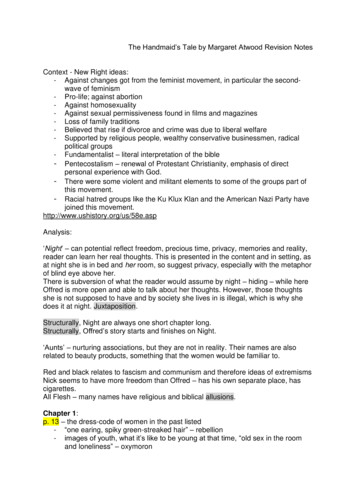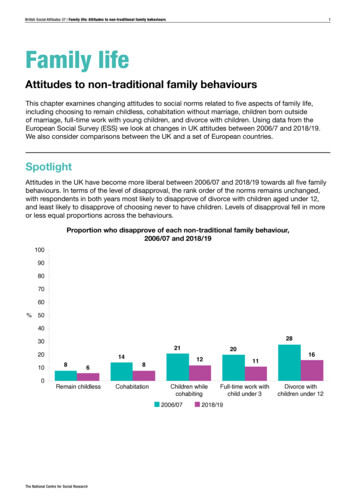
Transcription
HarperOne Reading and Discussion Guide for The Great DivorceReading and Discussion Guide forThe Great DivorcebyC. S. Lewis1. In the first chapter of The Great Divorce, the narratorquestions how people in the grey-colored town can besatisfied. Why does Lewis portray a town in which anyreal life is absent, yet there is little desire to movebeyond it? (Consider the conversation on p. 5.)2. Do you see any parallels between the grey town andour world?3. When the narrator meets George MacDonald as hisguide in Chapter 9, there is more of an explanationprovided about the grey town and the solid land. Ifghosts “leave that grey town behind it will not havebeen Hell,” MacDonald says. “To any that leaves it, it isPurgatory. And perhaps ye had better not call thiscountry Heaven. Not Deep Heaven . . . call it the Valley1For more reading and discussion guides like this one,visit www.smallgroupguides.com.
HarperOne Reading and Discussion Guide for The Great Divorceof the Shadow of Life” (p. 68). Is it helpful to thinkabout holding places—purgatories? Does the story suggest that we have a real choice after death? What doyou think about the idea that there could be “shadows,”or levels of heaven and hell?4. We learn that grey-town inhabitants can move to a newstreet and a new house by simply imagining it (p. 10).As a result, there is no interdependency or community,since there is no need to rely on one another. Howwould you rate the need for community in your life—your neighbors, your local store owners, your church,your area school? Have you seen this need fade due totechnology, the busy pace of life, or something else?5. The story moves from the grey void above and below tothe blinding, revealing light of another place in Chapter3. As they arrive in heaven, the bus passengers are likeghosts, and everything else is solid—rocks, grass, trees,even flowers that are hard like diamonds. What isLewis trying to say about the importance of our physical bodies and the way they might be changed in thelife to come?6. Why does Lewis use the familiar landscape of earthto describe the reality of heaven? (Look again atpp. 23‒24.)7. As the solid people approach the newly arriving ghosts,a ghost identifies the solid people as murderers onearth (pp. 26‒27). The surprise is parallel to the one inthe parable of the talents in Matthew 25:14‒30. Do you2For more reading and discussion guides like this one,visit www.smallgroupguides.com.
HarperOne Reading and Discussion Guide for The Great Divorcestruggle with God’s sense of justice and grace? How doyou measure the response of the solid person as itrelates to the call of faith about personal identity andmeasure of the self?8. In Chapter 5, our narrator overhears a solid, brightperson talking with the fat, cultured ghost from thebus. The fat ghost wants to be assured that his talentswill be used. The solid person responds, “I can promiseyou none of these things. No sphere of usefulness: youare not needed there at all. No scope of your talents:only forgiveness for having perverted them” (p. 40).How do you feel about the fact that, along with yourunworthiness of heaven, you are also not needed,according to Lewis? Does it change your sense ofbelonging if there’s nothing you can do to earn yourway into heaven, only the faith that the one providingthe way will be loving and forgiving?9. It’s clear that only some ghosts will make the transfor-mation into solid people. Others will return to the busand go back to the grey town. George MacDonald says,“There is always something they insist on keeping evenat the price of misery. There is always something theyprefer to joy—that is, to reality” (p. 71). What are thereasons for returning, and is this return final? (Lookat p. 74.)10. Do you agree that “all that are in hell, choose it,” (p. 75)as MacDonald tells the narrator? He defines two different people, “those who say to God, ‘Thy will be done,’and those to whom God says, in the end, ‘Thy will be3For more reading and discussion guides like this one,visit www.smallgroupguides.com.
HarperOne Reading and Discussion Guide for The Great Divorcedone’ ” (p. 75). In essence, MacDonald says, “The goodman’s past begins to change so that his forgiven sinsand remembered sorrows take on the quality ofHeaven: the bad man’s past already conforms to hisbadness and is filled only with dreariness” (p. 69). Inthe story, is attitude, faith, or works given as the way tobecome a solid person in heaven?11. Reread Chapter 10, and count the number of placesthat the ghost refers to herself as if her relationshipsand the present crisis of eternal consequences revolvearound her. Compare that with one of the first encounters with a solid person in Chapter 4: “I do not look atmyself. I have given up myself ” (p. 27). No wonderthat, at the end of Chapter 10, the ghost simply vanishes away into nothingness. How does our narratorbecome solid, and how does that relate to the idea oflessening his own needs, concerns, and fears whilestrengthening that “germ of a desire for God” (p. 98)?12. Why does Lewis use a threatened lizard that turns intoa great stallion in Chapter 11? Is this a confusing illustration? What’s the significance of using this particulartransformation? Think about Eden and this being thenew garden.13. When our narrator gets to heaven, the Lady says, “Weshall have no need for one another now: we can beginto love truly” (p. 126). What does this mean withregard to community and how Lewis envisions thisshifting in heaven?4For more reading and discussion guides like this one,visit www.smallgroupguides.com.
HarperOne Reading and Discussion Guide for The Great Divorce14. Hell is small in comparison to heaven. It’s lost in thelittle cracks that lead to heaven. “All Hell is smaller thanone pebble of your earthly world: but it is smaller thanone atom of this world, the Real World,” MacDonaldsays. “Look at yon butterfly. If it swallowed all Hell,Hell would not be big enough to do it any harm or tohave any taste” (p. 138). How does this help changeyour perception of the importance and the expansiveness of heaven?5For more reading and discussion guides like this one,visit www.smallgroupguides.com.
Hell is small in comparison to heaven. It’s lost in the little cracks that lead to heaven. “All Hell is smaller than one pebble of your earthly world: but it is smaller than one atom of this world, the Real World,” MacDonald says. “Look at yon butterfly. If it swallowed all H

